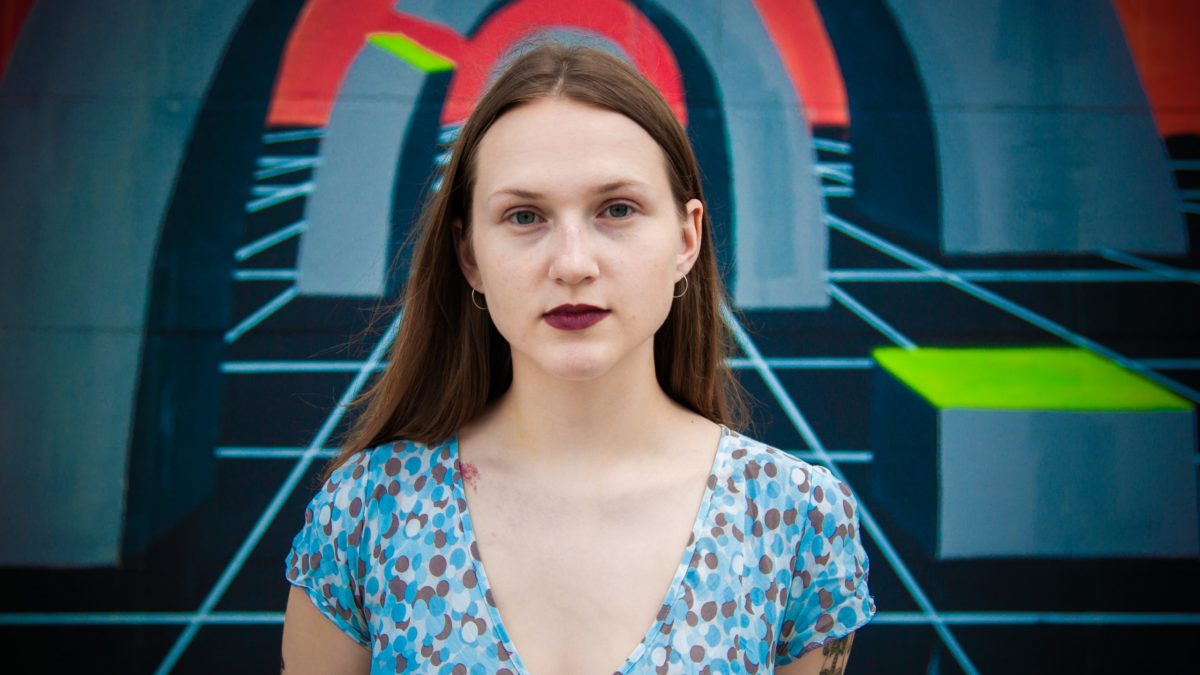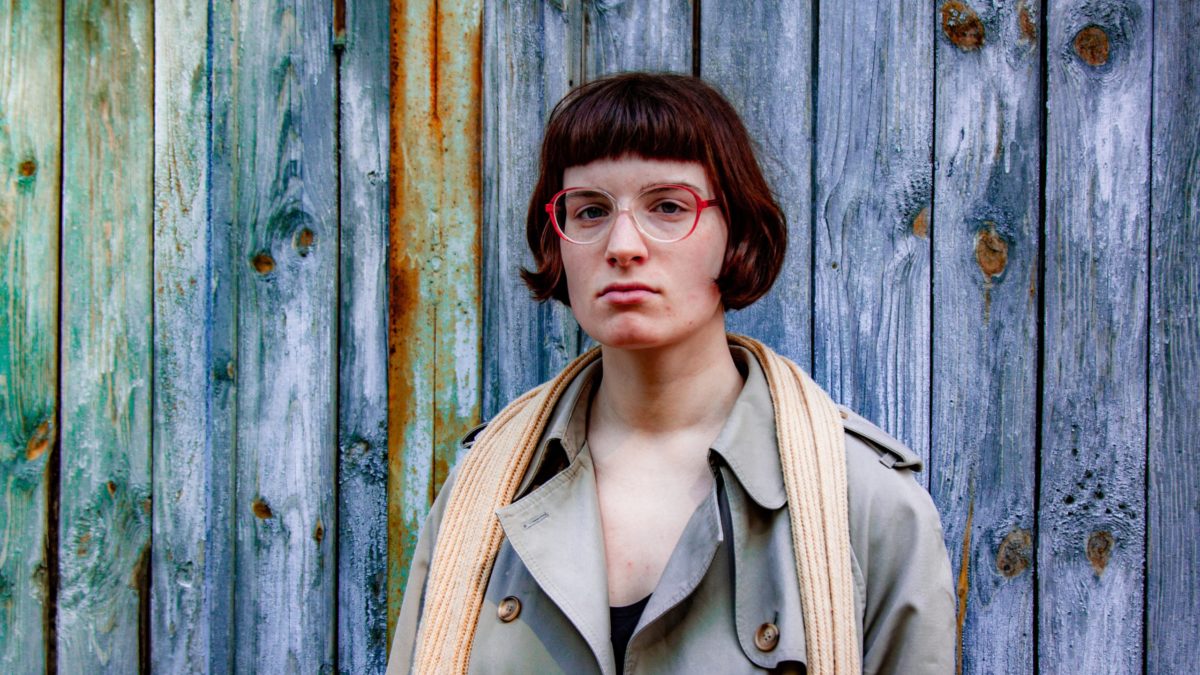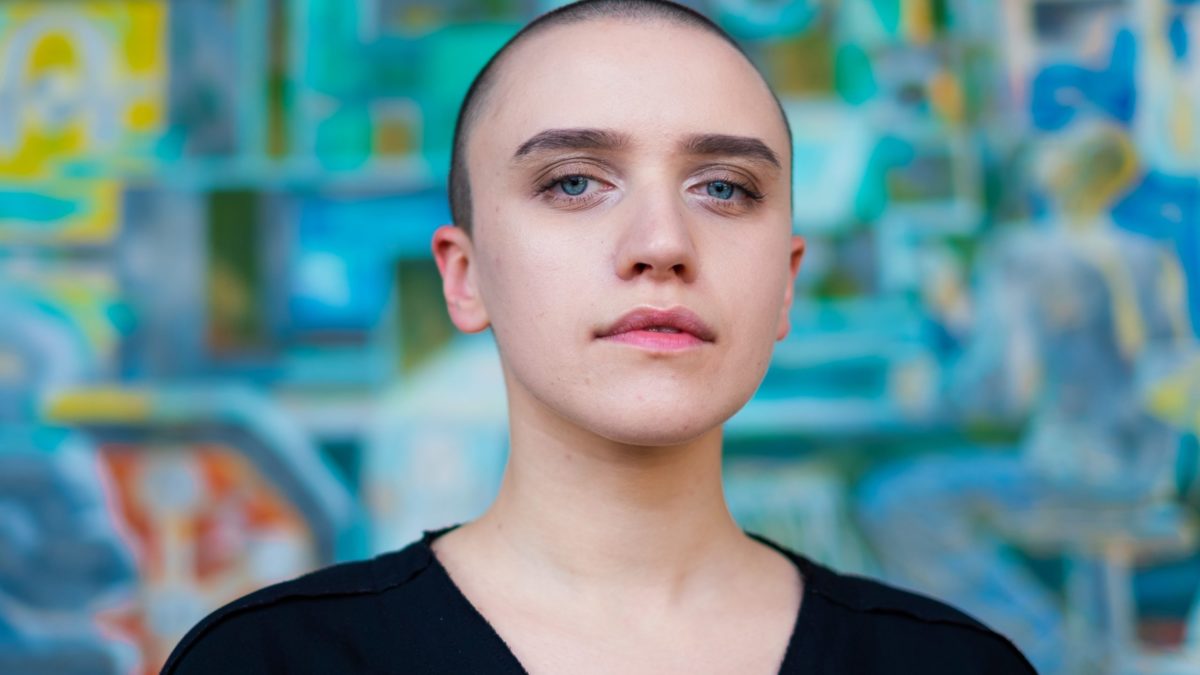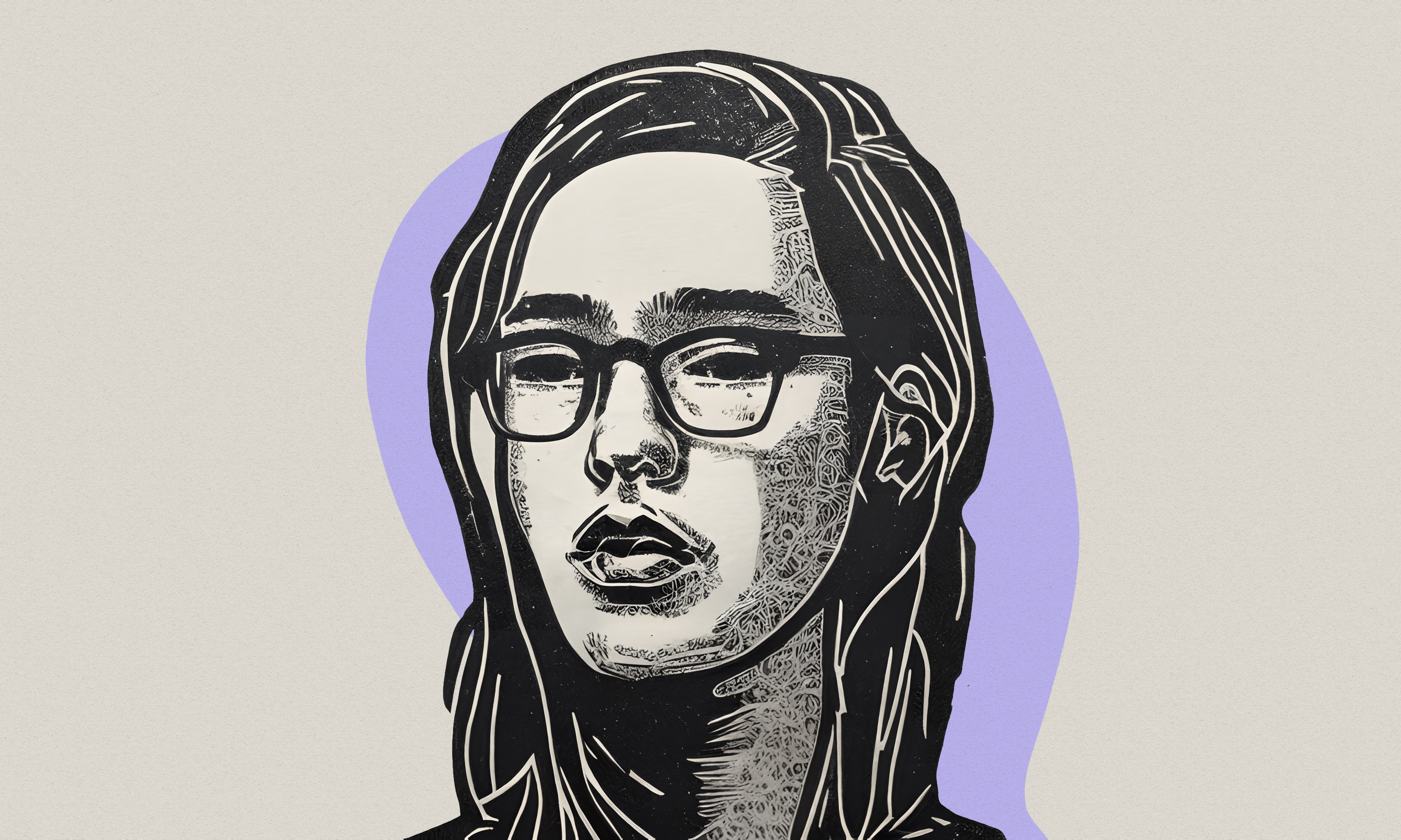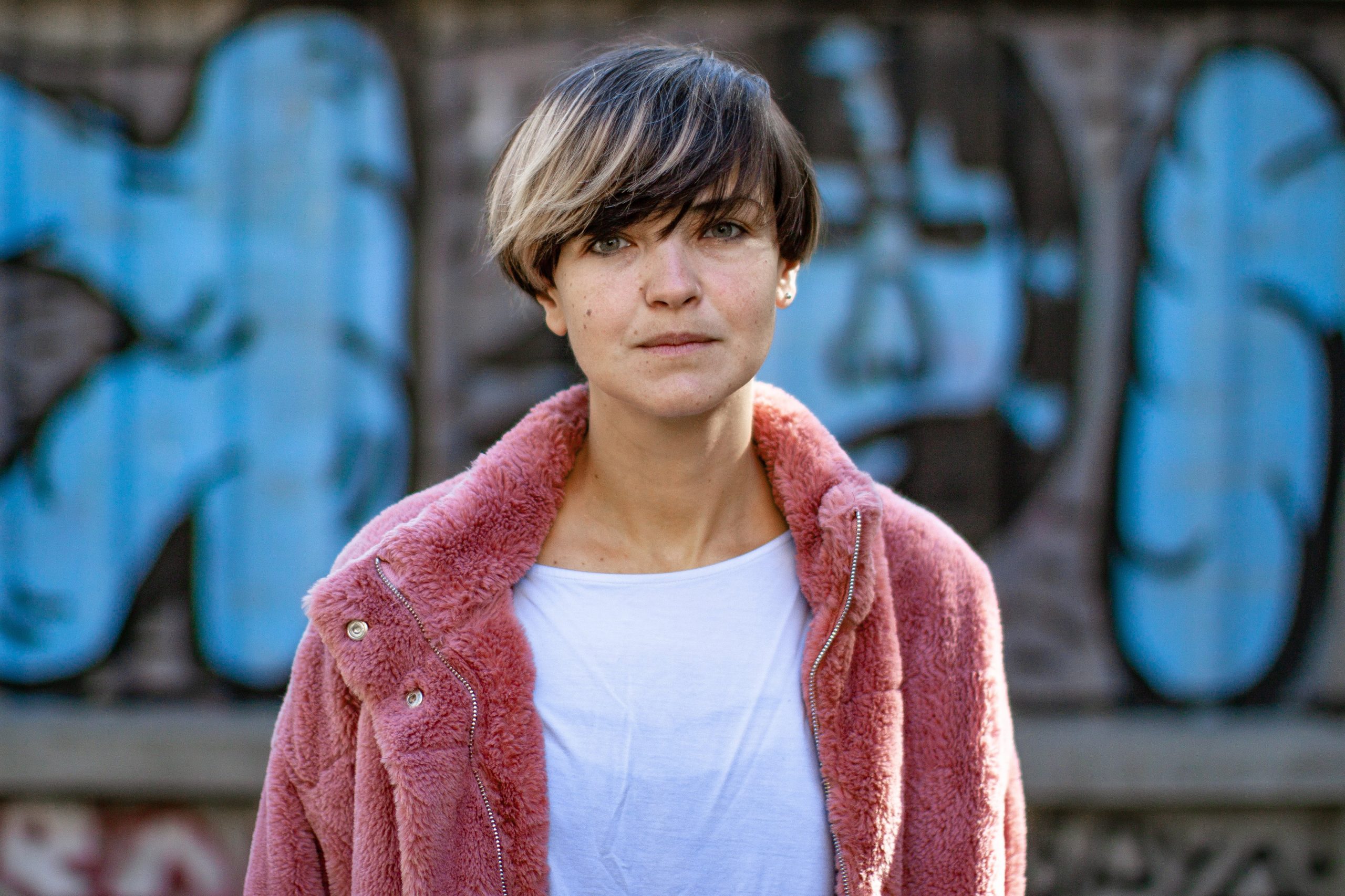On gender studies, radical attacks, and relationship with her body
Trigger Warning: the article mentions violation, self-harm and eating disorders.
31 August 2019
Editor: Bozhena Makovska
Translator: Maryna Isaieva
Photographer: Michael Tulsky
The fact of gender inequality in society I started to notice as a child, but I did not know what to call it. At school, in physical education classes, boys always went to play football, and girls were sent to “stretch out.” Once I joined the game and accidentally hit a guy in the stomach with a ball, he burst into tears and insulted me. Since then, I have been embarrassed to join them again. I was afraid of doing something wrong, spoiling everything, failing the team, so everyone would think it happened because I’m a girl and not because I’m a human being who can make mistakes.
I grew up in Zaporizhzhia, and for a long time, I had no friends, or at least I thought so. I spent a lot of time at home and entertained myself. For example, I opened a home hairdresser: made hairstyles for myself, dressed up in mother’s clothes, jumped from the closet with an umbrella because I wanted to fly. I was unhappy with my body, and people in my environment exacerbated this feeling. One of these days, I took duct tape and started wrapping it tightly around my belly to see how I would look like if I were skinny. Then my hands went numb. I could not breathe and hastily tried to find scissors. It was horrifying. I always mention this story in conversations about body-positive; that’s what beauty standards and cellulite jokes can do to a child.
As a teenager, I realized that I’m bisexual, and someday I can fall in love with a girl. I went to university and started working as a journalist in a local editorial. There I met girls who did not hide their relationship: we listened to “Night Snipers” and hung out together. Once at a concert by Diana Arbenina (lead singer of the group Night Snipers), a volunteer of the LGBT fund “Gender Z” approached us and invited us to visit them. Gender Z organized various events and games, and they also had psychological support groups for LGBTQ+ people. When I first came to them, my expectations did not coincide with reality: I thought it would be some sapphic poetry club! However, I liked the people who worked there and the way they created a safe space. I realized that I also want to do social work, help people as a volunteer, or have a permanent job in this area. There I became interested in feminism.
In Gender Z, I met my future girlfriend. We went on a date, and soon after that she went to Italy for a long time, her parents lived there. Then we started chatting all day. I was immersed in texting and, surely, my mother noticed this as we shared one PC. At that time, my mother tried to arrange my personal life and was setting me up with various men. It annoyed me a lot. The last time she did it, I could not stand it and confessed that I was chatting not simply with my friend but with the girl I love. It shocked her. I tried to explain that she was not guilty of anything that I was happy, and that was the most important thing. Mom could not accept me for a long time, and when Lena arrived, she met her coldly, with resentment. However, over time, everything worked out: mom loved Lena for her personality, she practically lived with us. After coming-out, one of my friends was kicked out of the house, so I think I’m lucky.

When I entered the Faculty of Philosophy at National Pedagogical Dragomanov University in Kyiv, I already knew that I wanted to study gender studies through philosophy. There was nothing about gender in the curriculum, so I started studying on my own and searched for information on the Internet. The first year I was not involved in activism because I did not know where to start. Together with my girlfriend, we moved to Kyiv and lived in my friend’s apartment while looking for a place. It was the time after the Maidan, quite tense period in Zaporizhzhia. People were waiting for the troops to enter the city. All our neighbours were making bomb shelters in the basements and stocking up on food. We weren’t sure whether mom could keep sending me money. Then my friend’s parents said that we didn’t need to look for anything and could live all together. Fortunately, the size of the apartment allowed it.
I did not like the way they teach at the university and did not communicate with other students. I continued to attend classes, and the rest of the time, I could not force myself to get up from the couch. All year I suffered from severe insomnia, depression and eating disorders.
“No matter how much I exercised, it was not enough for me. My efforts appeared to be incommensurable with the result.“
Back to Zaporizhzhia, followed by the desire to lose weight and change my life, I started to attend a ballet studio. I continued practicing it in Kyiv almost every day and achieved significant success. No matter how much I exercised, it was not enough for me. My efforts appeared to be incommensurable with the result. I was worried about what and how I eat. It seemed like I need to eat even less. For a while, I stopped drinking water. I was aware that all of this was abnormal and wrong. If I knew that someone else was doing this … I don’t know what I would do. Although I myself could not stop. Analyzing those events now, I conclude that this way, I tried to get out of codependent relationships and take control of my body. We broke up with a girlfriend, fell out with my friend, and I had to move on. Soon there was nothing to pay for a new apartment. At that time, I already had a dog, but there was neither food nor money. I was deeply depressed all over again. One of my old friends helped me a lot: he walked a dog, called me to dinner, and finally moved to me. Gradually, I began to feel better, and I got back to things I always wanted to do.

There were many sexist moments in our university, and I felt that I had to do something about it. I started talking with classmates, and one of them brought me to the LGBTQ organization, “Insight.” There I learned more about LGBT activism in Kyiv. Soon, I began engaging in activism: I wrote articles, went to events, and planned some of them at the university, including feminist readings for International Women’s Day. That’s how a student initiative, “Borsch”, was created. Initially, the title was chosen just for fun, but over time it turned into our main idea: we wanted to show well-known things from the other side, thus destroying gender stereotypes. In the Ukrainian context, borsch is associated with the image of a “women-keeper,” but in reality, it’s just a dish that everyone can cook. As part of the initiative, we provided lectures and discussions at Dragomanov University and in Zaporizhzhia, feminist readings and a cinema club. We also planned to maintain pages on social networks, but it turned out to be too resource-intensive. For the same reason, the initiative fell apart.
“It was important for me that the club could function in a safe and, at the same time, open space.“
After that, a teacher from the faculty of religious studies, who was aware of my activities, contacted me. She offered to create a gender discussion club, and we began to work on its concept together. It was important for me that the club could function in a safe and, at the same time, open space. This way, students and people who could not get higher education would be welcomed there. That’s why we chose the free art space “Sklo” at the university. The first club meeting already attended ultra-right group representatives. They did not hide their intention to disrupt the event and insisted on entering since we were “open.” I listened to their requirements and spoke out the internal rules of conduct in the club. When they refused to abide by them, I closed the door. That day the meeting was successful.
The next time these guys brought in elder colleagues — leaders of ultra-right organizations. They prevented us from opening and filmed everything on camera; it was already impossible to besiege them. I didn’t know if I could call the police. Students called a representative of the administration, but instead of forcing them to leave, she invited us to discuss the conflict. For an hour and a half, we listened to their demands all over again, and when it became unbearable, I declared the meeting closed. As it turned out later, someone called the police, one of the right-wing radicals brandished a knife on the street, and then helped his friend to remove the EU flag from the university building and trample it. The patrol arrived a few hours later and did nothing.

“I hoped that the publicity would prevent them from hushing up the case, but in the end, no one was punished.”
We held the third meeting of the gender club at another university, and everything went calmly. The fourth session was transferred back to Sklo. It was the end of December 2017, few people came on New Year’s Eve; and at first, I was upset. The next moment three men in balaclavas burst into the room. I recognized two of them: the guy with a knife and his friend who tore the flag. They began to pepper-spray everybody, and several people were injured. The university security guard passively observed and allowed them to leave. I understood that I had to find out who had been that third guy so that the police could identify him. In the heat of passion, I ran after him and tried to tear off his mask, but it didn’t work out: they splattered my face, hit me with the door, and ran away. I quickly recovered and called an ambulance. A friend of the teacher took us to the police station, where we talked for a long time about everything that had happened. The police recorded this and even showed me photographs of the people I spoke about in the database. For a long time, they refused to give the case number. I had to ask friends to send media inquiries, and one of them was responded. They told me that no proof of corpus delicti had been found since I (the victim) had refused to undergo a forensic medical examination. But no one even offered me to go through it.
After that, the head of the student council publicly accused me of what had happened. They blamed me for realising that it would be so and that I had endangered the club members as I hadn’t hired private security, accused me of PR. The university administration began to put pressure on teachers and forbade us to gather. Then I threw all my energy into creating a resonance: I wrote to the Ministry articles for the media, asked human rights organizations and others to send letters to the rector. I hoped that the publicity would prevent them from hushing up the case, but in the end, no one was punished. The attackers continued to attend classes. Everyone at the university knew that they had done it, but no one condemned their actions. This was my last course, and I finished it to get a diploma.

A little later than in a year, Alyona Mamay wrote to me with an offer to become a co-curator of the exhibition “Vykhovni Acty” (“Education acts”). I was delighted with this opportunity because, at that moment, I was exhausted by the struggle and disappointed with its results. This way, I could show the university administration that I was not giving up. The exhibition was devoted to censorship and various forms of violence in society, including right-wing radical violence. It was important for Alyona to do it in “Sklo.” The curator of the space supported this idea for some reason. We obtained the endorsement and set to work. At first, we invested personal funds in creating works by artists, and when the money ran out, we asked for help.
I negotiated with the police, and they provided security for us. We were ready for attacks, although right-wing radicals didn’t appear at the event. Instead of it, they intimidated the curator of the art space. The university administration also put pressure on her, and in the end, they decided to close the exhibition. We asked for time to dismantle the works, as parts of them were large-scale, and announced a protest rally demanding the administration to voice its position. This time we had much more support, some reporters arrived, but they were not allowed inside. Alyona and I could get to Sklo and decided to stay there until our requirements would be met. In the evening, the vice-rector responsible for placement arrived there — he insulted us, attacked the journalist of Hromadske TV, but in the end, agreed to speak at a press conference. After a while, someone took all our works to the police station, where they are still being held for unknown reasons. Despite the great resonance in the media, the press conference did not happen. Everybody at the university acted as nothing had happened.

“This trip was the last straw for me.“
At the end of May, “Insight” invited Alyona and me to the “Equality Festival” in Chernivtsi, with a lecture on political art, where we could talk about our exhibition. We arrived and smoothly got to the festival. Still, protesters began to gather under the building: members of religious organizations, representatives of the clergy, right-wing radicals, whose faces we already knew, and people in military uniforms. We were informed about the mines, after which the protesters entered the building. The evacuation began, during which the priest fanned us with a censer and read a prayer. He pushed me into a cloud of gas, which the ultra-right sprayed below, with the words: “Ladies — go ahead.” Police cordoned off the entrance. The private security that the festival hired opened the umbrellas, and under them, wrapped in scarves, we went outside. Opponents tried to break through the cordon, shouting to the police: “You are not real men if you protect them. Give them to us. We know what to do with them!” Someone threw a hammer in our direction, but, fortunately, no one was hurt. This trip was the last straw for me. I returned to Kyiv and ended up in the hospital with nervous exhaustion.
For a long time, I could not do anything. I tried to recover and started doing something else. That summer, the sewing cooperative “ReSew” announced the project “Dream clothes that do not exist” — a series of workshops for people from the LGBTQ+ community who find it difficult to find clothes in the mass market. I passed the selection and sewed a wedding dress. In Ukraine, I could not wear it for my own wedding — we have banned same-sex marriage, but I specially made the dress comfortable for me to walk in it every day. I also planned to embroider the inside of the hem with quotes from Hole songs, verses by Sylvia Plath and Anne Sexton, but I ran out of time. The whole process turned out to be much more complicated than I imagined. I had to dissolve the dress and alter it again many times. We worked for hours, I completely focused on sewing, and this became therapy for me. When I put on a dress I sewed myself, I experienced joy — now it is one of my favourites. With activism, everything is more complicated. I know that I will not see the result of my efforts, but the thought that I am approaching helps me not give up.

